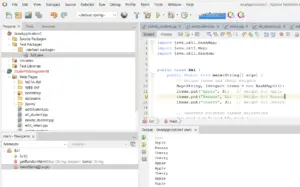Generating Random Numbers with Weights in Java
Random number generation with weighted probabilities is a common requirement in various programming scenarios, such as game development, statistical sampling, and machine learning algorithms. Java provides several approaches to accomplish this task efficiently.
in this tutorial To generate random values with weights in Java, you can use a weighted random selection technique. Here’s a simple example:

Here is the Example
import java.util.HashMap;
import java.util.Map;
import java.util.Random;
public class Ex1 {
public static void main(String[] args) {
// Define items and their weights
Map<String, Integer> items = new HashMap<>();
items.put("Apple", 5); // Weight for Apple
items.put("Banana", 1); // Weight for Banana
items.put("Cherry", 3); // Weight for Cherry
// Generate weighted random selections
for (int i = 0; i < 10; i++) {
String randomItem = getRandomItem(items);
System.out.println(randomItem);
}
}
public static String getRandomItem(Map<String, Integer> items) {
// Calculate the total weight
int totalWeight = items.values().stream().mapToInt(Integer::intValue).sum();
// Generate a random number in the range of 0 to totalWeight
int randomValue = new Random().nextInt(totalWeight);
// Iterate through the items and subtract weights to find the selected item
for (Map.Entry<String, Integer> entry : items.entrySet()) {
randomValue -= entry.getValue();
if (randomValue < 0) {
return entry.getKey();
}
}
throw new RuntimeException("Should never reach here if weights are correctly defined.");
}
}
- Weights: Each item is assigned a weight. Higher weights mean the item is more likely to be selected.
- Total Weight: Sum of all weights is calculated.
- Random Value: A random number is generated between 0 and the total weight.
- Selection: The method iterates through the items and subtracts their weights from the random value until it finds the selected item.